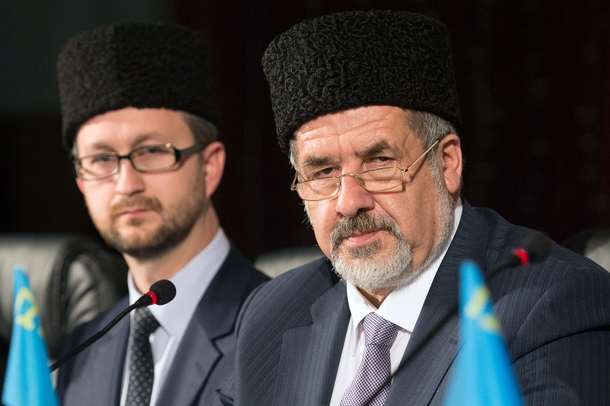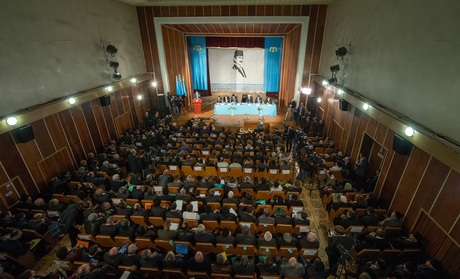Bakhchisaray, Crimea -- As the reality of having to live in another country begins to sink in for Crimeans, one ethnic group, the Crimean Tatars, are reviving a long-held dream: to live autonomously on the peninsula.
At a March 29 session in the historical Crimean Tatar capital of Bakhchisaray, the Kurultay, or Crimean Tatar national council, approved a resolution to press for self-determination and national territorial autonomy in Crimea.
“It is now clear to all who based their decisions on the right to self-determination, that they must understand the Crimean Tatar people have that exact same right,” said Refat Chubarov, head of the Crimean Tatar Mejlis, in a clear reference to Russia’s justification of its incursion into Crimea a month ago.
While Russia claims it annexed Crimea to protect the rights of ethnic Russians on the peninsula, the Crimean Tatars have long asked both the Soviet Union, and then Ukraine, to recognize their right to Crimean autonomy.
A Turkic, Muslim people, they represent around 12 percent of the Crimean population of two million people, but consider Crimea their historical homeland. In 1944 the entire population was deported to Siberia or Central Asia on Josef Stalin’s orders.
After decades of peaceful protest, around 200,000 finally returned in the early 1990s. They continued to demand, largely in vain, that the Ukrainian government recognize their historic claim to Crimea and guarantee protection of their language and culture.
Since Russian troops effectively took over a month ago, the Crimean Tatars have suddenly become a political force to be reckoned with. The Mejlis (their political arm) declared the new Crimean government and the March 16 referendum illegal, and called for a national boycott which the vast majority of Tatars upheld. Meanwhile, both Russia and Ukraine began to woo the Crimean Tatars with promises of representation and protection.
Ukraine adopted a resolution recognizing the Crimean Tatars as the indigenous people of Crimea on March 20. For most Crimean Tatars, it was almost an insult, coming after 23 years of prevarication. However, it does open the door to declaring Crimean Tatar autonomy in Crimea, should Ukrainian law be reasserted on the peninsula.
“We’ll appeal to all governments that are directly involved, and that will be Ukraine first of all, to be governed by our resolution,” Chubarov told the Kyiv Post. “The processes that are happening now have speeded everything up. It’s made some people seriously engage with areas they should have engaged with 20 years ago.”
Russian President Vladimir Putin has also said that he recognizes Crimean Tatar rights to representation in government and education in their own language. Tatar representatives from the Russian Federal Republic of Tatarstan have flocked to Crimea, talking of brotherhood and cooperation in religious, business and cultural spheres. The new Crimean parliament has said it will allocate a 20 percent quota for Crimean Tatar representatives.
Nevertheless, most Crimean Tatars realize that while today’s situation in Crimea may be their opportunity to reach their dream, the Kurultay resolution is mostly declarative.
“Nothing has been decided, it’s all under question,” said Gerai Abduliev of Bakhchisaray. “But everything is possible in this world. Who would have thought we could turn out to be in Russia? If that’s possible, then so is autonomy. So far it’s a formality, but a formality can lead to real action.”
The Kurultay resolution references the 2007 United Nations declaration which states that indigenous people have the right to self-determination; to autonomy and self-government; to full engagement in political, economic, social and cultural life; that military activity on their land can take place only with their permission or at their request; and that they have full access to decision making and conflict resolution with their own and other governments. It announces the start of political and legal procedures to establish autonomy on their historical land of Crimea, including appealing to international organizations and governments for support.
Herein lies a dilemma which the Kurultay continued to debate long after the resolution had been approved. The international community has not so far come to their aid. Whether they like it or not, de facto and according to Russian law, Crimea is now part of the Russian Federation. The Crimean Tatars are faced with a choice – to cooperate with the new Crimean authorities within a Russian legal and actual framework in order to protect and promote their rights, or to boycott a government and legal process they consider illegitimate.
The choice directly affects not just their political leaders or those working in district authorities and state structures, but every single Crimean Tatar who must now decide whether taking a Russian passport is necessity or betrayal.
After many hours of heated debate, the Kurultay finally deputised the Mejlis to decide whether Crimean Tatars will participate in the new Crimean government. But Chubarov’s position is clear: that Crimean Tatars have to be represented at all levels of power. “It was a very difficult discussion, about how ethical or moral it is to put forward candidates to those organs that…have questionable legitimacy,” he said. “But the discussion is centred on facts that have happened and that we have to recognise: not their legitimacy, but their existence.”
Meanwhile, he said whether to take a Russian passport was every person’s individual decision, but he advised not to give up Ukrainian passports. “Say you lost them,” he told the Kurultay. “If Russia can lose its troops in Crimea, I think we can lose a few passports.”
Crimean Tatars who had met together to plant trees outside the mosque in Bakhchisaray, were divided on the Kurultay session. Beset by practical questions with no answers about land registration, house ownership, bank accounts, their children’s education, their sons’ service in the Russian army, they had little time to celebrate the prospect of autonomy and most agreed reluctantly with Chubarov’s pragmatic approach to the new authorities.
“We have to cooperate with them to decide these problems,” said Abduliev, planting hazel trees with his son. “Whatever they are, they’re still in power de facto and we can’t get away from that. We’re already cooperating, we’re in talks with them, we’re living in that legal framework already.”
“I feel like [the Kurultay] shouldn’t cooperate but they decided otherwise,” added pensioner Dilyaver Aliev. “This is how we live now, we have no choice. Autonomy would be very good, we wanted it for so many years. But it’s not good that we are no longer in Ukraine. We are closer to Ukrainians, we've been with them for 25 years, we have a lot in common. And now we have to give up our Ukrainian passports and take Russian ones, or else what do we do – leave Crimea? We can’t do that, we should live here.”
by Lily Hyde
source: kyivpost.com




